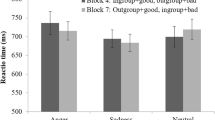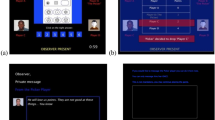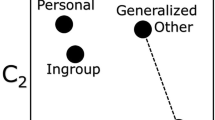Abstract
The current work proposes that awe can promote identification with a broader group, including both ingroups and outgroups, thereby reducing the blatant dehumanization of obese people. We supported this theoretical model in 4 studies (N = 606). In Study 1 (N = 137), people with obesity were blatantly dehumanized (i.e., considered less evolved). In Studies 2 and 3 (N = 377), by using various manipulations of awe (i.e., watching videos and imagining scenarios) and various measurements of common ingroup identity (CII) and by comparing awe with different emotions (i.e., neutral and general positive emotions), we repeatedly observed the unique effects of awe: awe weakened the blatant dehumanization of people with obesity, which was mediated by increased CII with them. In Study 4 (N = 92), priming higher CII with obese people led to less blatant dehumanization, supplying causal evidence for the complete mediation model between awe and blatant dehumanization. The findings of the current work indicate that awe may alter identification with a superordinate group, reduce the blatant dehumanization of outgroup members and improve intergroup relationships.



Similar content being viewed by others
Data availability
The data and files in study will be made available on request.
Notes
Study 1 additionally included repeated-measures ANOVAs for subtle dehumanization (measured by the attribution of humanness and needs; see ESM). At least 30 participants were needed to detect a medium effect size (f = 0.25, α = 0.05, 90% power). Considering all these analyses together, the minimum recruitment was 119 participants.
In Studies 2 and 3, we additionally conducted one-sample t tests to examine whether obese people were subtly dehumanized (measured by the denial of UH traits in Study 2 and the denial of needs in Study 3; see ESM). According to G*Power analyses, at least 180 participants were needed to detect a medium effect (f = 0.25, α = 0.05, 90% power) for these analyses.
Non-nature neutral and nature neutral conditions = 0, non-nature awe and nature awe conditions = 1.
The Helmert contrast codes categorical X as X1 and X2. X1 refers to the comparison of X1 “awe vs. other emotions” (awe = 0.66…, positive emotions = − 0.33…, neutral = − 0.33…), and X2 refers to the comparison of “positive emotions vs. neutral emotion” (awe = 0.00, positive emotions = 0.50, neutral = − 0.50).
The seven questions were also used to check manipulation. Participants whose total score was below 5 were excluded.
References
Albarello, F., & Rubini, M. (2012). Reducing dehumanisation outcomes towards blacks: the role of multiple categorisation and of human identity. European Journal of Social Psychology,42(7), 875–882. https://doi.org/10.1002/ejsp.1902
Bai, Y., Maruskin, L. A., Chen, S., Gordon, A. M., Stellar, J. E., McNeil, G. D., Peng, K., & Keltner, D. (2017). Awe, the diminished self, and collective engagement: Universals and cultural variations in the small self. Journal of Personality and Social Psychology,113(2), 185–209. https://doi.org/10.1037/pspa0000087
Boysen, G. A., Isaacs, R. A., Tretter, L., & Markowski, S. (2020). Evidence for blatant dehumanization of mental Illness and its relation to stigma. The Journal of Social Psychology,160(3), 346–356. https://doi.org/10.1080/00224545.2019.1671301
Bruneau, E., Szekeres, H., Kteily, N., Tropp, L. R., & Kende, A. (2020). Beyond dislike: Blatant dehumanization predicts teacher discrimination. Group Processes & Intergroup Relations,23(4), 560–577. https://doi.org/10.1177/1368430219845462
Cakal, H., Eller, A., Sirlopú, D., & Pérez, A. (2016). Intergroup relations in Latin America: Intergroup contact, common ingroup identity, and activism among indigenous groups in Mexico and Chile. Journal of Social Issues,72(2), 355–375. https://doi.org/10.1111/josi.12170
Capozza, D., Trifiletti, E., Vezzali, L., & Favara, I. (2013). Can intergroup contact improve humanity attributions? International Journal of Psychology,48(4), 527–541. https://doi.org/10.1080/00207594.2012.688132
Chirico, A., Glaveanu, V. P., Cipresso, P., Riva, G., & Gaggioli, A. (2018). Awe enhances creative thinking: an experimental study. Creativity Research Journal,30(2), 123–131. https://doi.org/10.1080/10400419.2018.1446491
Christoff, K. (2014). Dehumanization in organizational settings: some scientific and ethical considerations. Frontiers in Human Neuroscience,8, 748. https://doi.org/10.3389/fnhum.2014.00748
Duan, W., & Feng, Y. (2018). Weight stigma: discrimination and bias against obesity. Advances in Psychological Science,26(6), 1074–1082. https://doi.org/10.3724/SP.J.1042.2018.01074
Ejova, A. (2019). Awe as a social emotion: an overview of insights from social neuroscience and self-categorisation theory. e-rhizome,1(2), 160–166. https://doi.org/10.5507/rh.2019.009
Gaertner, S. L., & Dovidio, J. F. (2000). Reducing intergroup bias: the common ingroup identity model. Psychology Press.
Gariepy, G., Nitka, D., & Schmitz, N. (2010). The association between obesity and anxiety disorders in the population: a systematic review and meta-analysis. International Journal of Obesity,34(3), 407–419. https://doi.org/10.1038/ijo.2009.252
Gordon, A. M., Stellar, J. E., Anderson, C. L., McNeil, G. D., Loew, D., & Keltner, D. (2017). The dark side of the sublime: distinguishing a threat-based variant of awe. Journal of Personality and Social Psychology,113(2), 310–328. https://doi.org/10.1037/pspp0000120
Griskevicius, V., Cantú, S. M., & Van Vugt, M. (2012). The evolutionary bases for sustainable behavior: implications for marketing, policy, and social entrepreneurship. Journal of Public Policy & Marketing,31(1), 115–128. https://doi.org/10.1509/jppm.11.040
Guan, F., Chen, J., Chen, O., Liu, L., & Zha, Y. (2019). Awe and prosocial tendency. Current Psychology,38(4), 1033–1041. https://doi.org/10.1007/s12144-019-00244-7
Haslam, N. (2006). Dehumanization: an integrative review. Personality and Social Psychology Review,10(3), 252–264. https://doi.org/10.1207/s15327957pspr1003_4
Haslam, N., & Bain, P. (2007). Humanizing the self: moderators of the attribution of lesser humanness to others. Personality and Social Psychology Bulletin,33(1), 57–68. https://doi.org/10.1177/0146167206293191
Haslam, N., & Loughnan, S. (2014). Dehumanization and infrahumanization. Annual Review of Psychology,65(1), 399–423. https://doi.org/10.1146/annurev-psych-010213-115045
Hayes, A. F. (2013). Introduction to Mediation, Moderation, and conditional process analysis: A regression-based Approach. The Guilford Press.
Jardina, A., & Piston, S. (2022). The effects of dehumanizing attitudes about Black people on whites’ Voting decisions. British Journal of Political Science,52(3), 1076–1098. https://doi.org/10.1017/S0007123421000089
Jiang, T., & Sedikides, C. (2022). Awe motivates authentic-self pursuit via self-transcendence: Implications for prosociality. Journal of Personality and Social Psychology,123(3), 576. https://doi.org/10.1037/pspi0000381
Jiang, Z., Wang, Z., Jing, X., Wallace, R., Jiang, X., & Kim, D. (2017). Core self-evaluation: Linking career social support to life satisfaction. Personality and Individual Differences,112, 128–135. https://doi.org/10.1016/j.paid.2017.02.070
Keltner, D., & Haidt, J. (2003). Approaching awe, a moral, spiritual, and aesthetic emotion. Cognition and Emotion,17(2), 297–314. https://doi.org/10.1080/02699930302297
Kersbergen, I., & Robinson, E. (2019). Blatant dehumanization of people with obesity. Obesity (Silver Spring, Md.),27(6), 1005–1012. https://doi.org/10.1002/oby.22460
Kteily, N. S., & Landry, A. P. (2022). Dehumanization: Trends, insights, and challenges. Trends in Cognitive Sciences,26(3), 222–240. https://doi.org/10.1016/j.tics.2021.12.003
Kteily, N., Bruneau, E., Waytz, A., & Cotterill, S. (2015). The ascent of man: Theoretical and empirical evidence for blatant dehumanization. Journal of Personality and Social Psychology,109(5), 901–931. https://doi.org/10.1037/pspp0000048
Leach, C. W., Van Zomeren, M., Zebel, S., Vliek, M. L. W., Pennekamp, S. F., Doosje, B., Ouwerkerk, J. W., & Spears, R. (2008). Group-level self-definition and self-investment: A hierarchical (multicomponent) model of in-group identification. Journal of Personality and Social Psychology,95(1), 144–165. https://doi.org/10.1037/0022-3514.95.1.144
Leyens, J. P., Demoulin, S., Vaes, J., Gaunt, R., & Paladino, M. P. (2007). Infra-humanization: The wall of group differences. Social Issues and Policy Review,1(1), 139–172. https://doi.org/10.1111/j.1751-2409.2007.00006.x
Liang, F., Xiao, Z., Bao, Y., & Zhao, Y. (2020). The Promotion Effect and mechanism of common Ingroup identity on psychological compatibility. Journal of Psychological Science,43(5), 1147–1153. https://doi.org/10.12677/ap.2022.122065
Luft, A. (2020). Three stories and three questions about participation in Genocide. Journal of Perpetrator Research. https://doi.org/10.21039/jpr.3.1.37
Luppino, F. S., de Wit, L. M., Bouvy, P. F., Stijnen, T., Cuijpers, P., Penninx, B. W., & Zitman, F. G. (2010). Overweight, obesity, and Depression: A systematic review and Meta-analysis of Longitudinal studies. Archives of General Psychiatry,67(3), 220–229. https://doi.org/10.1001/archgenpsychiatry.2010.2
Lv, Y., Shi, J., Yu, F., & Zhang, C. (2021). The effect of awe on natural risk-taking preferences: The role of need for closure. Current Psychology. https://doi.org/10.1007/s12144-021-01758-9
Pan, X. F., Wang, L., & Pan, A. (2021). Epidemiology and determinants of obesity in China. The Lancet Diabetes & Endocrinology,9(6), 373–392. https://doi.org/10.1016/S2213-8587(21)00045-0
Piff, P. K., Dietze, P., Feinberg, M., Stancato, D. M., & Keltner, D. (2015). Awe, the small self, and prosocial behavior. Journal of Personality and Social Psychology,108(6), 883–899. https://doi.org/10.1037/pspi0000018
Pirlott, A. G., & MacKinnon, D. P. (2016). Design approaches to experimental mediation. Journal of Experimental Social Psychology,66, 29–38. https://doi.org/10.1016/j.jesp.2015.09.012
Prade, C., & Saroglou, V. (2016). Awe’s effects on generosity and helping. The Journal of Positive Psychology,11(5), 522–530. https://doi.org/10.1080/17439760.2015.1127992
Ritchie, H., & Roser, M. (2017, August 11). Obesity. OurWorldInData.org. https://ourworldindata.org/obesity. Accessed 11 Aug 2017
Rivera, G. N., Vess, M., Hicks, J. A., & Routledge, C. (2019). Awe and meaning: Elucidating complex effects of awe experiences on meaning in life. European Journal of Social Psychology,50(2), 392–405. https://doi.org/10.1002/ejsp.2604
Schroeder, J., & Epley, N. (2020). Demeaning: Dehumanizing others by minimizing the importance of their psychological needs. Journal of Personality and Social Psychology,119(4), 765–791. https://doi.org/10.1037/pspa0000199
Seo, M., Yang, S., & Laurent, S. M. (2023). No one is an island: Awe encourages global citizenship identification. Emotion,23(3), 601–612. https://doi.org/10.1037/emo0001160
Shiota, M. N., Campos, B., & Keltner, D. (2006). The faces of positive emotion: Prototype displays of Awe, Amusement, and pride. Annals of the New York Academy of Sciences,1000(1), 296–299. https://doi.org/10.1196/annals.1280.029
Spencer, S. J., Zanna, M. P., & Fong, G. T. (2005). Establishing a causal chain: Why experiments are often more effective than mediational analyses in examining psychological processes. Journal of Personality and Social Psychology,89(6), 845–851. https://doi.org/10.1037/0022-3514.89.6.845
Yaden, D. B., Kaufman, S. B., Hyde, E., Chirico, A., Gaggioli, A., Zhang, J. W., & Keltner, D. (2018). The development of the Awe Experience Scale (AWE-S): A multifactorial measure for a complex emotion. The Journal of Positive Psychology,14(4), 474–488. https://doi.org/10.1080/17439760.2018.1484940
Zhao, H., Zhang, H., Xu, Y., Lu, J., & He, W. (2018). Relation between awe and environmentalism: The role of social dominance orientation. Frontiers in Psychology,9, 2367. https://doi.org/10.3389/fpsyg.2018.02367
Funding
No.
Author information
Authors and Affiliations
Corresponding author
Ethics declarations
Ethical approval
The current research was approved by the Ethics Committee of Beijing Normal University (Reference number: 202209280105).
Conflict of interest
The authors report no potential conflicts of interest.
Additional information
Publisher’s Note
Springer Nature remains neutral with regard to jurisdictional claims in published maps and institutional affiliations.
Electronic supplementary material
Below is the link to the electronic supplementary material.
Rights and permissions
Springer Nature or its licensor (e.g. a society or other partner) holds exclusive rights to this article under a publishing agreement with the author(s) or other rightsholder(s); author self-archiving of the accepted manuscript version of this article is solely governed by the terms of such publishing agreement and applicable law.
About this article
Cite this article
Lv, Y., Tang, Q., Wang, S. et al. Awe weakens the blatant dehumanization of people with obesity via common ingroup identity. Curr Psychol 43, 15328–15341 (2024). https://doi.org/10.1007/s12144-023-05509-w
Accepted:
Published:
Issue Date:
DOI: https://doi.org/10.1007/s12144-023-05509-w




